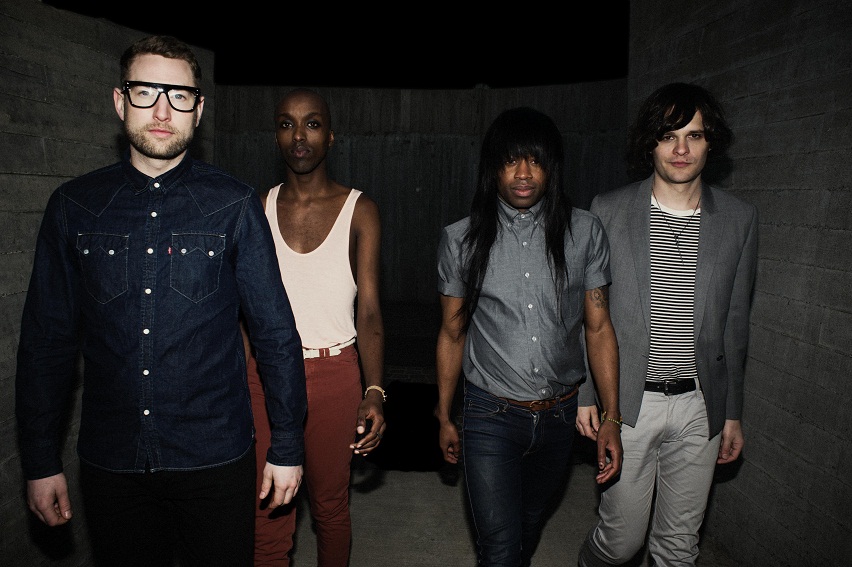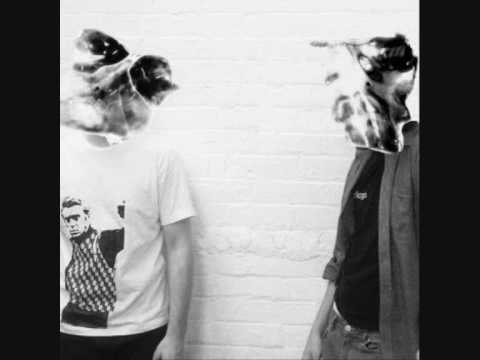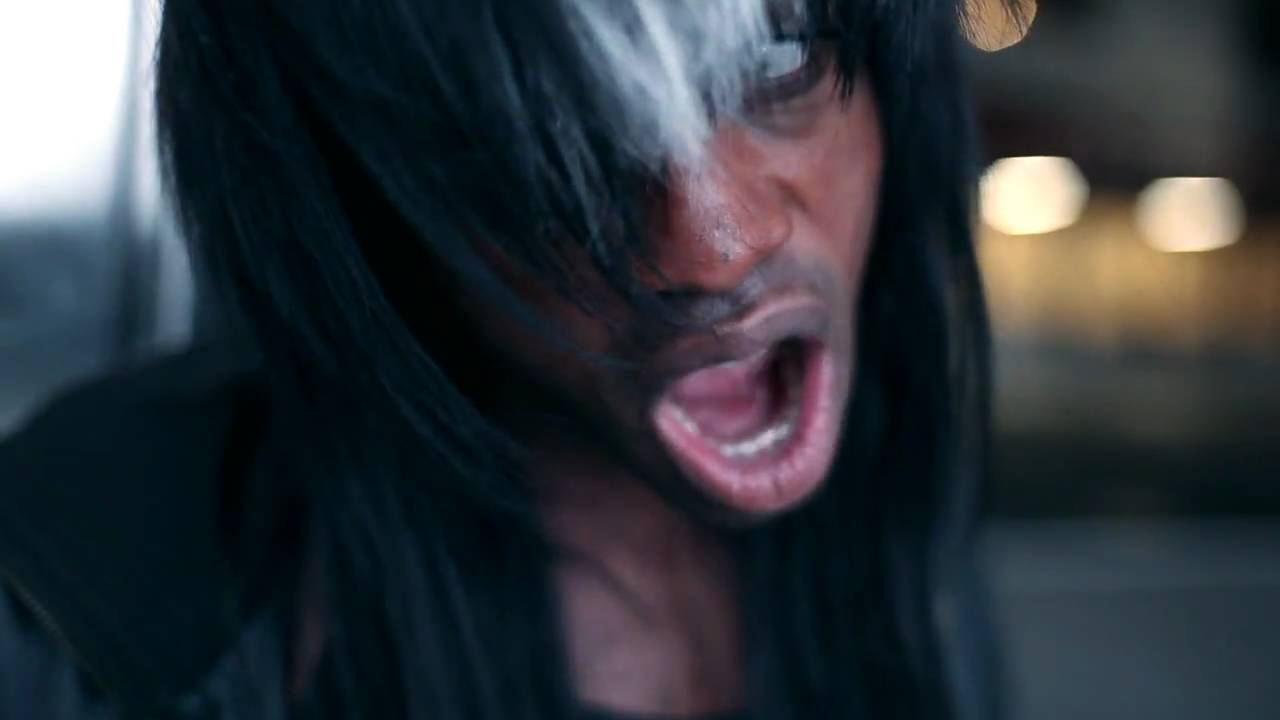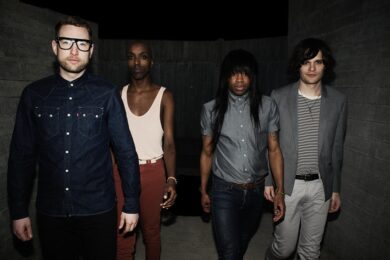Music industry sharks and hacks pack the entrance to XOYO for what is essentially a pre-release show for the much-hyped Friendly Fires’ upcoming second album. Standing in the shadows and foolishly ignored are support band Azari & III. The dancefloor is sparsely populated as they begin their set, which is a shame. Azari & III play with a confidence far beyond a support band, with an outré display to boot – singer Fritz sports a black wig (last seen in the cannibalistic, revenge-on-bankers video for ‘Hungry For The Power’), and strips off halfway through. In a performance structured more like a DJ set than conventional band run-through, second singer Cedric’s vocals are dubbed and sampled live, his falsetto tones echoing around the club. Not to be outdone, Fritz’s explicit vocal lines in ‘Hungry for the Power’ are demonically distorted and processed. It’s an energetic and engaging live performance that shows that, alongside Hercules & Love Affair, Azari & III currently stand head and shoulders above every other ubiquitous house group. What’s more, as Fritz will explain, they have a message that isn’t just about the vacuous hedonism of "getting on the floor" and "putting your hands up" celebrated by so many of their contemporaries.
This date at XOYO marked a three-day stint in London for Azari & III, and their first foray across the Atlantic, a big step for a band who are yet to release a full-length LP, but are attracting attention for, ‘Reckless (With Your Love)’ and the aforementioned ‘Hungry…’. Hailing from Toronto, the group is comprised of the titular pairing of producers Dinamo Azari (Christian) and Alixander III (Alphonze), with Fritz and Cedric up front. The Quietus caught up with all four of them the next day, and despite their hangovers, they exude the quiet confidence and determination of a band who have high expectations of what they themselves are capable of.
Your tracks ‘Reckless’ and ‘Hungry for Your Power’ are already on their way to being contemporary house staples. How do you feel about this acclaim?
Alphonze: It’s nice to be able to do something that’s very personal for society, and making people feel something. I’m really proud of our accomplishments.
Cedric: At the time we were just trying to make something different in dance music. The boys [Christian and Alphonze] have been in that scene for a while but I had no idea what house was three or four years ago, I really wasn’t into it. They aren’t into being pigeon-holed as house emulators; they use old analogues but try to make more modern music.
Fritz: It’s really cool to receive all of this praise but it’s such a bubble and you can get used to loving it on blogs, but this is the first time as a foursome we are travelling the world and get to see the real response to it. Christian and Alphonze have been touring for a while but we’ve only played Montreal and New York. I’m super excited.
So what got you into house music and what’s the scene in Toronto like?
Christian: House is a freedom of expression. There’s no like ‘you have to sing about this or that’, it’s more open, it’s ghetto, it’s classy, it’s such a good mix. We don’t shy away from people saying ‘you make great house music’, but when they hear the album, I want people to perceive us as a little more than that.
A: It’s tough for them, they’re attracted to a party jammer kind of track, and with our first single, it’s easy for people to assume that.
Ce: I can’t speak for Fritz but at the time I wasn’t really aware of house or techno or the categories. I didn’t really get it. But because of them (Alphonze and Dinamo), I did a bit of homework and went by ear, really. I had nothing to do with house music until I got thrown into it.
F: I’ve known Dinamo [Christian] for six years. I used to go to his house and play records, make crepes and smoke joints so in that respect it’s all pretty familiar, Dinamo’s influence and his taste. We used to perform at parties together and dress up. We have a very long history together so it was all kind of like a natural progression. They brought me in and they were doing this amazing stuff and I just kind of slid in there.
Why do you think that the hedonism of house works well as a vehicle through which you can explore darker themes?
A: It’s generally a statement of the lifestyle that the artist is living. You live underground, the culture and the money, stuff that isn’t accepted by mainstream society, and then you’re giving it to the audience, and they are involved in it as well. Like rap, the urban language changes, and that’s the connection that the audience wants. If it goes mainstream, then the underground people will find a new way to re-connect with their people when it is commercialised and the art is taken away from them and made into a mockery. If you are a strong artist, you can have strong music and it still resonates no matter how big the production is.
Ch: I think we have taken house and disco up a notch, there’s already been ‘can you feel it’, you can jump on the trend but we wanted to be trend-setters, and we like to call it ‘modern music’.
A: We are not too concerned with the format, but the sentiment and the content. Yeah the production counts too, but it’s not the forefront of the record.
F: It’s got to do with the lifestyle. It was important when we were in the studio to try to actually say something, to put something real into the lyrics. It’s really easy to say ‘get to the floor’ and ‘put your hands up’, but it was important to say something meaningful, display how we feel.
Ce: We’d show up and be like ‘how do you feel today?’, ‘we’re feeling reckless about the decisions we’re making in our lives’. It goes on and doubles up with other aspects and what other realities are.
Why do you believe the role of the diva is so integral to house music?
F: The vocals are always uplifting. You have that commanding voice, the flowing vocals and the character of the diva on the mountain top looking down, delivering the word, and you’ve got to have that confidence.
Ch: Fritz is far from a diva. He’s an artist, he’s a character. But it’s truly like-minded individuals, who come together from different parts of the world, and you share the same dreams and aspirations and like some of the same music. When I heard Alphonze’s music, I was gravitated to it before we even met. And next thing you know I’m working with him. And Cedric, diva or no diva, that voice is special, and he’s like family now.
So the whole multiculturalism of Toronto helped.
Ch: Definitely. In the past, with our bands, we embraced the multiculturalism side of things. Giving in to some of the more Latin influences. I like to think we are not just drum machines, we take percussion seriously. I play steel drums. Alphonze plays guitars. We are musicians.
A: Instrumental music works on a lot of levels, but if you really want to connect to people, it’s a combination of the sentiment of the lyrics and the melodies that you choose.
So you don’t believe that music without lyrics can connect?
A: It can connect even deeper. House music can take you through every range of emotion; inspire your own visualisations of what’s going on. And we love a lot of artists who have used that, where lyrics are the melody, and you don’t understand what they’re saying.
Ch: With ‘Indigo’, the sound of the voice is used as an instrument. So it can resonate through all cultures. We decided not to use lyrics. All cultures can connect with the human voice, that’s beyond a diva. That’s healing.
A: The human voice is the most complex instrument. Why avoid it?
Ch: With Fritz, we really like to have fun, play with his vocals, and turn it into so many different things.
A: An angel and a demon.
Ch: It’s fun to toy with the technology, and give the voice different personae.
You have previously mentioned how improvisation is crucial to your show. To what extent do you see the same elements in jazz as an influence on your work? Is this in the studio as well as on stage?
A: It keeps it fresh.
Ch: We don’t stick to a script; we can re-interpret each song differently each night.
A: It’s something we’d probably want to see done. To bring some of that, and the fuck-ups that go with it. If something goes wrong, people will remember that, there’s nothing wrong with that.
F: In the studio that’s where I learned a lot. Just going with the flow and turning the ramblings into songs. The first take of ‘Hungry’ is all just riffing. In the live show now there are moments like that where they just go crazy and we don’t know what’s going on.
I read how your music is a reaction to conservatism, and how it represents this new culture of self-aware young adults who resist the status quo of society, and are ‘hungry for the power’. Can you explain this a bit further?
A: It’s a reaction to those hipsters who jump into the centre of something that they don’t understand. They’re hungry for the blog post. We’re fighting ourselves as well, our own internal battle; you’ve got to monitoring yourself.
Ch: It’s also a love song. You fuck with me day and night, why are you doing that? There’s a whole other way of looking at it.
F: Toronto is incredibly conservative and wealthy. It is the centre for commerce in the whole of Canada. Living in the west end of Toronto, in the poorest area downtown, we were downtrodden and had nothing and see the hypocrisy of the city and see these artists and kids who have struggled really hard, doing amazing things but without any support. And for those who do get support, and we are like ‘that’s what you do with the money that you get?’ It’s easy to talk about it when we and our friends actually lived it.
But sometimes people don’t think about the deeper meaning and just sing along. Do you mind that?
F: No you can’t get mad at that. At least they’re singing. Hopefully eventually they’ll get it. That’s what videos are for. You see it, and then it all clicks into your head.
But if they know the deeper meaning and how you are discussing taboo subjects, doesn’t that take away from the fun aspect?
F: That’s hard to answer, because everyone we’ve been surrounded by understands it. I really don’t know. The bottom mark, if we can reach as many people as possible, that’s a good thing.
Ce: I’d rather people did understand it. If you are just singing along, to me it just feels empty.
So you don’t like people singing to your songs?
Ce: No but if you don’t get it, then it’s a bit like ‘what’s the point?’
F: Music in general, you listen to it for the content. I know a lot of people don’t, but I’d like to think that the majority of music –lovers listen to music because it speaks to them in some way.
But house music isn’t necessarily there for people to bond with.
F: I disagree. I remember being much younger, and hearing this music that was about being young, gay and black person and it was amazing. The fact that this woman or man was telling me that I was the fiercest person on the planet, thank you because people don’t tell me that in my everyday life. In ever day life people would tell me that I’m stupid or to shut up. So even simplistic lyrical format like ‘put your hands up’, ‘you’re amazing’, that says a lot to people. People need to hear that. It’s sad but it’s true.
You seem to be very much in touch with the roots of clubbing, as a form of escapism where everyone is equal. How did you initially get into the clubbing experience? Do you remember your first ever time inside a club?
A: I actually tuned out when club culture took over from warehouse culture. But I remember my first rave, in Hamilton, Ontario, near Detroit. Seeing Richie Hawtin play to 200 people, pay 10 dollars, hit the acid, everyone on the same batch of LSD. We were just 14 year old skaters across the road, saw the lights and heard the sound, went in there, danced there for 2 hours, then skated the half pipe and landed tricks we never landed again because we were so in the zone.
C: I remember doing some psychedelics, and I actually blacked out, so I’m almost surprised myself that I embraced the culture because it was a scary experience but I loved it. It’s just one big therapy session.
A: It’s an escape for disillusioned kids from the burbs. Only a few people became victims, a lot of the people I know became creative, successful people.
F: I moved to Toronto from northern Canada. I’d only ever seen it on TV, but we finally got some money together. We took drugs for the first time, and everything starts to click together. You see a sea of people, looking across the room and smiling at you. It was so overwhelming, the world is such a big place but for a few hours it’s such a small place.
How do you reconcile this clubbing lifestyle with your healthy lifestyle?
A: We are responsible people, we know how to balance. Sometimes it is a big problem, though.
C: Whether you are gay, straight, or a druggie, we try not to judge you. We come out, provide something that’s uplifting. The drugs don’t bother us at all. Everything has drugs. Life is a drug. Just look at pharmaceutical companies. Drugs are just a part of culture in general.






